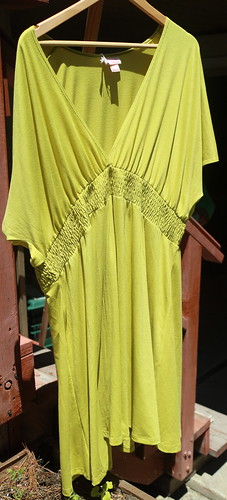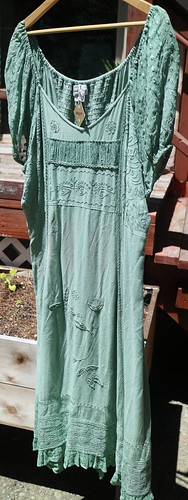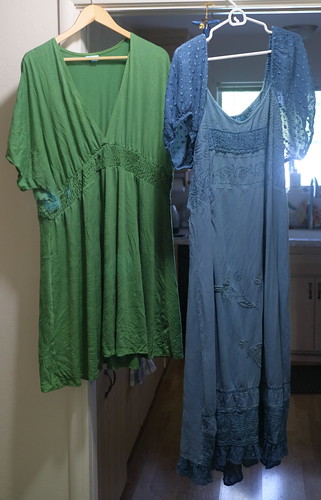(All right. Look, I know “Man in the Mirror” is stuck in your head. I’d say I’m sorry, but the words are apropos just now, so… okay, sorry. Sorry! Fine.)
“Never doubt that a small group of thoughtful, committed citizens can change the world. Indeed, it is the only thing that ever has.” – Margaret Mead.
It’s rising summer, and oddly seasonal as are so many who didn’t get out the relentless educational cycle when they were done with school, I now equate September/autumn with renewals and new beginnings, and … June with renewals and new beginnings. And January. And February.
I’m always ready for a change, even if it’s just to the color of my dress.
An election year always has people thinking that elections have something to do with change; it’s reflected in the various slogans and mission statements people toss around. “People for change” is one I saw from someone or other – Libertarians? Green Party? I don’t know. I’ve been voting faithfully since I was of age, and I know that election years have nothing to do with change – I mean, the talking heads change, but everything else stays the same. And no, I’m not trying to be hyper cynical. The system is designed so that not much can change. We kind of built in stolidity into our political system. Four wheels but no engine; it shall not be moved.
Four wheels isn’t all that bad, though. I mean, there’s something to be said for stability, after all; no one would want a political unicycle or anything. And, with four wheels, there the potential for movement, if one gets behind a thing and pushes. If it’s on an incline, maybe. Pointed the right direction.
I’ve already voted, and really, my present snark isn’t only about the political process in terms of elections. It’s about the politics – the governance of who does what – of everything: jobs, school or church organizations as well as political parties. The loud and sometimes intelligible/unintelligent discussions on how we determine who we are; those discussions happen on school boards and staff meetings, on social media and around family dinner tables. Yesterday, I involved myself, briefly, in a discussion on the politics of writing diversely.
Who determines whose voice is used? Who decides whose reality is presented? Who decides what “reality” actually is? These are the questions I found reverberating as I read a piece in Voya this month. A male dominant culture writer positioned himself as wanting to explore the life of a black girl growing up in his crime-ridden hometown of Flint, Michigan. He described his editor’s hesitation, the horror of his black colleagues and the reactions of pre-readers. He then complained that authors of color have been critical of all of his contributions. In the article, he wrote fervently of his positive intentions, of his work on behalf of teens of color, and of the importance of work which is a “mirror” and provides a realistic reflections of people of color written for reluctant readers.
In the interest of full disclosure, prior to my having read this article, I read a couple of this author’s books and reviewed one.
On the simplest level, the author has a point: there’s a need for books written for reluctant readers. Period. To a greater extent, however, his assumption is flawed. That those readers – reluctant readers of color – can only relate to works which present kids in chaos situations, teens in gangs, with underemployed or under-educated parents, on the wrong side of the law, is flawed. His idea that his “mirrors” his reluctant reader student’s reality is additionally flawed. His books, to me, reinforce the stereotype that there is nothing else going on with people of color – no middle ground, certainly no middle class, and that anyone who is a reluctant reader is poor, in a gang, or violent. “Tanisha, pass me the blunt,” indeed!
Yet, he seemed genuinely baffled as to why people of color who read his books before and after publication try to tell him that they reinforce stereotype. The emotions were there – genuine frustration and hurt and maybe a little huffy indignity. And, I felt for him, in a number of ways. In others, I found myself smacking myself in my head ’til my ears rung, because I felt like I was being gaslighted. Subtly, subtly, reality had been rearranged until it was me, the meanie who was critical who was wrong, and the person who blatantly asserted his right to write in a I reject your reality and substitute my own fashion… was right.
About that time, my eye started twitching.
I’m a person who is sensitive and obsesses and worries about hurting people, so being “political” is not usually what I am. I tend to stay silent, but this past weekend I briefly spoke up on a couple of issues, until I started to feel a burgeoning shriek arises from my consciousness, and realized I needed to do something more than discuss things in 140 character snippets. Still not sure what that “something” is, however. The author mentions he’s going to begin encouraging his students to write. It is my sincere hope that this causes him to see them and their lives as real and nuanced as well.
Yesterday, I found myself wondering if our political discussions really change anything. I think the answer is “no.”
Not with any lasting effect. Not right away, anyway. Talking won’t change as much as acting. The actions which would help us parse the political issues in publishing right now are the ones I’m taking: writing books which reflect realistic, nuanced, and well-rounded characterizations of the “self” as person of color, and promoting the work of others – of whatever color – whose books reflect these same nuanced, well-rounded, realistic and dual-identified POC in their novels, and …that’s it. This has been my “shut up and write” PSA.
Life’s but a walking shadow, a poor player
That struts and frets his hour upon the stage
And then is heard no more: it is a tale
Told by an idiot, full of sound and fury,
Signifying nothing.


